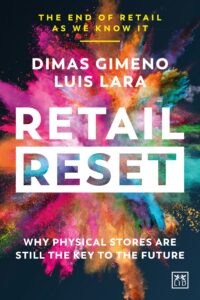|
Are physical stores dying? by Dimas Gimeno & Luis Lara
By Guest Contributors Dimas Gimeno & Luis Lara
Authors of Retail Reset, Dimas Gimeno and Luis Lara, reveal what the four waves of change in retail are.
A great silent revolution is underway… We are witnessing the end of retail as we have known it to date. Many companies are sticking to business models that made sense 20 years ago, but they no longer work
Some experts forecast a “retail apocalypse”, but it will not occur. On the contrary, we believe the essential retail reset will bring about a “renaissance” of physical stores. They will become far more important than they have been in the past 100 years. We are going to experience a new rebirth in many consumer industries and, very specifically, in retail.
Contrary to the belief, common among many managers, consultants, academics and economists, the radical paradigm shift in the distribution sector is not driven only by the internet and technology. Instead, there is a succession of waves of change accumulating and affecting all sectors in general and retail, very specifically. Since the 1990s, four waves of change have affected everything we do: globalization, digitization, socialization, and sustainability.
How do these waves affect retail?
They build up and change, and their impact on the economy and society, in general, is becoming stronger. These waves help us understand what the consumers of the future will be like. The pandemic has transformed them, and they are already among us, distinguished by shopping patterns and behaviours that will affect the evolution of the retail sector in the years to come.
The first one is Globalization. Our competition is no longer across the street or in our malls; it may be on the other side of the world. Technological advances and the drastic reduction of distances have allowed customers to know of and demand products and services unavailable in their places of origin, creating a single global market for many industries. Consumers in all countries demand the same kind of products and brands that are identical or very similar with minor adjustments. It is not enough to remain in a single (or a few) territory: our competitors at the other end of the world can take away our market. Moreover, going global strengthens the value chain of companies successfully competing in foreign markets. Globalization has brought about a new kind of consumer without borders. This new kind of global customer reserves their spending capacity for special moments of the year when they travel.
This wave of globalization has led to a saturation of brands, products and stores in every country. It is in this environment that successful companies must go global; otherwise, it will be difficult for them to survive. The companies that decide to focus on one or a few markets will not find it easy to survive.
The second wave is Digitalization. Since the internet began, the business sector has spent years experiencing a massive migration from an economy based on the physical to one based on the digital. The question is not whether our company will be affected but when, and what we plan to do. Enormous technological and logistical advances have solved the problem of accessing a product that sales distribution used to solve. It is no longer necessary to open stores on every street, in every shopping mall, city or town to serve each market and allow customers to access products. There’s practically nothing we can’t find online with our smartphone, whether nearby or in some distant country, and have shipped to our home.
The third wave is Socialization. It means that markets – previously defined by cities, towns, regions or states – are now grouped into cross-border social movements and trends with different purposes, even political ones. This phenomenon makes it necessary to watch emerging interest groups and recognize their new role and how it may affect our company.
The proliferation of screens in the hands of consumers and the adoption of new technologies by companies have put immense power into our hands (that is, into our fingers), speeding up transactions and interactions between people and companies. Consumers have immense power in their hands: to create and grow brands or destroy them. They are no longer passive. Instead, they are active – even activists. Our brand is not what we say it is; it is what they say it is. A fundamental consequence of socialization is the need for radical transparency; we must continually reaffirm our organization’s values and principles that guide us at all levels when making decisions.
The fourth wave is Sustainability. It represents the need for companies to prove they have a social and environmental positive impact. The pandemic turned global retail into a ground-zero impact area since the stores in all countries had to shut down, and consumers had to quickly migrate to the digital world to continue shopping.
The trend toward sustainability, social impact and purpose that began to gain strength in the late 2010s accelerated. Any company that wants to continue being relevant in the future must now consider a sustainability roadmap. During this decade, there will be enormous pressure to adopt stricter measures that will reduce environmental impact and focus primarily on climate change, biodiversity, and the shortage of resources.
There’s an opportunity for companies to reflect on their culture, their own values and what they represent and to align themselves with social or environmental causes that are consistent with these values. By doing so, they can become models for consumers looking to belong to a community of people with like-minded ideas.
How can retail companies prepare to face all these shifts and their implications in their business, operational and economic models? You can find out in our book Retail Reset.
ABOUT THE AUTHORS

Dimas Gimeno is the former CEO of El Corte Ingles. Today, he is Executive President of WOW, a new retail and lifestyle concept recently opened in Madrid. He is based in Madrid, Spain.

Luis Lara is the Managing Partner of Retalent, a growth strategy consultancy. He is based in Madrid, Spain.
Suggested Reading
 In Retail Reset, the authors explore strategies to promote the rebirth of the retail sector and the companies that operate within it. This reset is based on enhancing the emotional connections with consumers (through memorable content and experiences) so that stores will surprise again. Moreover, it rests on integrating the physical and digital so that shopping, whether online or offline, becomes a connected and singular experience. Ultimately, physical stores remain important for the future of retail and distribution because they offer a live experience and the kind of person-to-person experience that cannot be matched online. However, consumer expectations and behaviour have changed, and the stores of the future will have to transform to keep attracting their attention.
In Retail Reset, the authors explore strategies to promote the rebirth of the retail sector and the companies that operate within it. This reset is based on enhancing the emotional connections with consumers (through memorable content and experiences) so that stores will surprise again. Moreover, it rests on integrating the physical and digital so that shopping, whether online or offline, becomes a connected and singular experience. Ultimately, physical stores remain important for the future of retail and distribution because they offer a live experience and the kind of person-to-person experience that cannot be matched online. However, consumer expectations and behaviour have changed, and the stores of the future will have to transform to keep attracting their attention.
